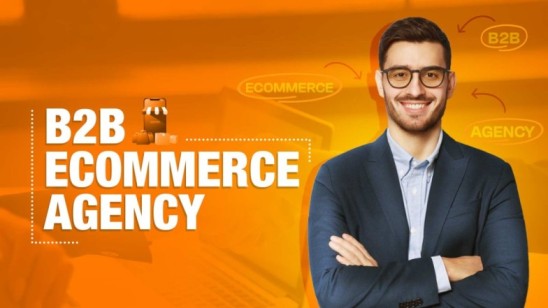
B2B Ecommerce Agency: What Do They Offer?
B2B trades involve companies such as wholesalers, manufacturers, and online retailers, as opposed to B2C (business-to-consumer) sales, which involve businesses and individual consumers. Facilitating and optimizing these complex transactions is where B2B e-commerce agencies come in.
A good B2B ecommerce agency will develop and implement strong e-commerce systems to facilitate business-to-business buying and selling. Accurate and efficient bulk ordering, personalized pricing, and state-of-the-art inventory management systems are common elements of such agencies.
B2B e-commerce companies also provide the incorporation of technological solutions to improve company operations as a whole, which is an essential service. They offer more than just this, let’s dive in to know further!
How Does B2B Work?

One company selling its wares to another company is the bedrock of business-to-business interactions. Everything from small, transactional deals affecting one division of the purchasing organization to large, enterprise-wide agreements are all part of this business-to-business paradigm.
Many business-to-business transactions are organized in such a way that the vendor meets the demands of a certain division or team inside the purchasing organization.
This can involve providing sophisticated technology solutions, office furniture, or productivity software, all of which are vital tools for any organization.
Choosing a product in the business-to-business sector is often a more involved procedure than in the consumer sector. The chosen products or services will be in line with the company’s overall objectives and needs.
Types of B2B Ecommerce
In the realm of business-to-business (B2B) ecommerce, there are several distinct categories that companies typically fall into. Each category has advantages and disadvantages, and many businesses operate simultaneously within multiple categories.
1. Wholesale:
Wholesale businesses purchase goods in large quantities from distributors or manufacturers to subsequently offer them to retailers or end users at reasonable prices. Utilizing buyer-oriented B2B marketplaces can be an effective strategy for wholesalers to showcase their products to potential buyers while minimizing marketing efforts. In these marketplaces, buyers have online platforms inviting manufacturers and suppliers to display their offerings and submit bids.
2. B2B2C (Business-to-Business-to-Consumer):
In this model, companies sell directly to end consumers, bypassing intermediaries. Manufacturers or wholesalers produce goods, which are then sold to other businesses that sell them directly to consumers. This approach often involves using digital storefronts where customers may need to realize the product wasn’t manufactured now by the selling company.
3. Distributor:
Manufacturers sometimes outsource tasks such as packing, shipping, and marketing to distributors. These partnerships enable manufacturers to focus on production while distributors handle logistics and sales. Online platforms facilitate establishing relationships between manufacturers and distributors, streamlining supply chains and enhancing customer satisfaction.
4. Manufacturer:
Manufacturers are responsible for producing large quantities of goods, which they may sell to wholesalers, other manufacturers, or suppliers. For example, a manufacturer might produce shoelaces that are then sold to a luxury shoemaker for incorporation into finished products. With the digital shift, manufacturers are increasingly expected to fulfill digital demand and offer flexible online transaction options to wholesalers, suppliers, and other B2B entities and consumers.
Best B2B eCommerce Platforms
Selecting the right B2B ecommerce platform is crucial for businesses looking to establish or expand their online presence in the digital marketplace. These platforms offer a wide range of features and functionalities tailored to meet the unique needs of B2B operations, including bulk ordering, account-based pricing, custom catalogs, and integration with enterprise systems. Here are five of the best B2B ecommerce platforms available today:
1. Magento Commerce:
Magento Commerce is a robust and highly customizable ecommerce platform that caters to both B2C and B2B businesses. It offers a comprehensive suite of features specifically designed for B2B operations, including support for multiple buyer roles and permissions, custom pricing and discounts, RFQ (Request for Quote) functionality, and integration with ERP (Enterprise Resource Planning) systems. Magento Commerce also provides advanced inventory management capabilities, sophisticated reporting tools, and a wide range of third-party extensions to extend its functionality further.
2. Shopify Plus:
Shopify Plus is the enterprise-level version of the popular Shopify ecommerce platform, offering scalability, reliability, and flexibility for B2B businesses of all sizes. It provides a user-friendly interface, intuitive product management tools, and extensive customization options to create a unique B2B buying experience. Shopify Plus supports account-based pricing, bulk ordering, customizable catalogs, and integration with popular B2B tools like Salesforce and HubSpot. Additionally, Shopify Plus offers robust security features, PCI compliance, and 24/7 customer support to ensure the success of B2B ecommerce operations.
3. BigCommerce B2B Edition:
BigCommerce is a cloud-based ecommerce platform that offers a dedicated B2B Edition tailored to the needs of wholesale and manufacturing businesses. It provides a comprehensive set of B2B features, including custom pricing and catalogs, customer-specific catalogs, quoting functionality, and integration with ERP and CRM systems. BigCommerce B2B Edition also offers advanced marketing tools, SEO features, and responsive design templates to create a seamless buying experience across all devices. With built-in security and scalability, BigCommerce B2B Edition is an excellent choice for businesses looking to grow their online presence.
4. Oracle Commerce Cloud:
Oracle Commerce Cloud is an enterprise-grade ecommerce platform that offers a wide range of features and capabilities for B2B businesses. It provides
- advanced personalization and segmentation tools,
- support for complex pricing structures,
- flexible order management options, and
- integration with Oracle’s suite of enterprise applications.
Oracle Commerce Cloud also offers built-in AI-powered analytics, predictive search capabilities, and multi-site management functionality to streamline operations and drive growth. With robust security, scalability, and global support, Oracle Commerce Cloud is ideal for large-scale B2B ecommerce operations.
5. SAP Commerce Cloud:
SAP Commerce Cloud is a comprehensive omnichannel ecommerce platform that caters to the needs of B2B businesses across industries. It offers a wide range of features, including support for complex product configurations, customizable pricing and discounts, RFQ functionality, and integration with SAP’s suite of enterprise applications. SAP Commerce Cloud provides advanced marketing tools, customer segmentation capabilities, and AI-powered personalization to deliver a tailored buying experience. With built-in security, scalability, and enterprise-grade support, SAP Commerce Cloud is a top choice for businesses looking to drive digital transformation and accelerate growth in B2B e-commerce.
What Does A B2B Ecommerce Agency Do?

A B2B eCommerce marketing agency acts as the bridge between businesses seeking digital transformations. Some of their services are:
B2B Ecommerce Web Development And Customization
When it comes to the specific requirements of business-to-business transactions, no one does it better than a B2B eCommerce development agency.
Their main goal is to build websites that businesses can easily engage with; these sites must be safe, scalable, and easy for users to navigate.
An important part of customization is making sure the platform fits the clients’ needs. This includes things like complex inventory management systems, bespoke pricing structures, and bulk ordering.
Agencies like Oyolloo lay the groundwork for effective business-to-business interactions in the digital sphere by utilizing technology to enhance the user experience. We have skilled developers working restlessly to make the perfect B2B ecommerce solutions for you.
Analytics And Digital Marketing
Business-to-business eCommerce agencies are masters at creating and implementing digital and technical marketing plans that boost their businesses’ online presence.
Using data-driven insights and analytics, these agencies optimize marketing strategies across the board, from account-based marketing to targeted lead creation.
Their expertise lies in the specifics of business-to-business marketing, where their efforts are directed towards increasing recognition of the brand, creating high-quality leads, and fostering lasting connections.
Businesses can make better decisions and fine-tune their strategies for maximum impact in the competitive B2B landscape by using analytics tools to analyze and measure the performance of campaigns.
Industry Knowledge And Niche Specialization
A lot of B2B eCommerce companies choose to specialize in one or two industries. By focusing on a specific industry, they can learn all about its nuances and difficulties. Thus, by focusing on a particular industry, these agencies are better able to meet the specific needs of companies operating in that field.
Clients looking for an in-depth knowledge of their unique market dynamics will be attracted to them by this technique, which also boosts their reputation and positions them as leaders in the field.
Nevertheless, there are obstacles to overcome, such as keeping abreast of market changes and possible restrictions on client variety.
Technology Solutions
Business-to-business eCommerce agencies like Oyolloo play a crucial role in implementing cutting-edge technological solutions to improve company processes.
This involves introducing various software solutions, such as customer relationship management (CRM) systems and tools for supply chain management.
Building a digital ecosystem that can change to meet the unique needs of business-to-business interactions is the ultimate objective. As strategic allies, we help companies adapt to the ever-changing digital market by recommending and implementing innovative technology.
What Are The Benefits Of Partnering With A B2B Ecommerce Agency?

Once you partner with a B2B ecommerce development agency, you will gain access to many important benefits for your business.
Specialist Knowledge
The benefit of forming a partnership with a B2B eCommerce agency is having access to specialist knowledge. These companies have extensive knowledge of B2B transactions and are familiar with the specific difficulties and needs of companies in this sector.
Agencies like Oyolloo have extensive experience in building local and global SEO-optimized, user-friendly websites, and integrating complex technological solutions guarantees that your online platform will be customized to fulfill the unique requirements of business-to-business interactions.
Cost-Effective
It can be more economical to hire a B2B eCommerce agency rather than keep an in-house team. Instead of spending money on employing and keeping a full-time workforce, you can save money by partnering with organizations that charge by the project.
In this way, companies may save money without sacrificing efficiency; they can use that money toward building and improving their online platforms.
Reduced Time To Market
Your online store or platform can be launched faster with the help of a B2B eCommerce marketing agency because of their expertise and their shortened development process.
Businesses can take advantage of market opportunities and remain ahead of competitors due to their knowledge of industry best practices and their ability to handle potential hurdles.
Scalability
This is a key consideration for B2B agencies when they develop platforms. Your digital infrastructure can be easily expanded or modified by these firms to meet the evolving needs of your growing business.
You can rest assured that your online presence will stay strong and able to handle more transactions thanks to its scalability. This will allow you to grow in the long run without having to make frequent changes or interruptions.
Strategic Partnerships
These agencies frequently already have industry networks that they may use through strategic partnerships. The establishment of strategic alliances with other companies and service providers is made easier when firms join forces with agencies because of the access these networks provide.
By working together, businesses may increase their competitiveness in the B2B market and explore new opportunities for client acquisition, revenue growth, and industry collaboration.
Top B2B Ecommerce Trends In 2024
In 2024, the B2B e-commerce landscape is set to undergo significant transformations driven by evolving consumer preferences, technological advancements, and market dynamics. Here are the top seven B2B ecommerce trends that businesses should watch out for:
1. Enhanced Efficiency with Ecommerce Tools:
As businesses strive to streamline their operations and improve productivity, adoption of e-commerce tools will continue to rise. These tools encompass various solutions, including order management systems, inventory management software, and customer relationship management (CRM) platforms. By leveraging these tools, B2B companies can automate repetitive tasks, optimize workflows, and enhance the overall efficiency of their sales processes.
2. Personalized Shopping Experiences:
Personalization will play a pivotal role in B2B e-commerce as businesses seek to cater to their customer’s unique needs and preferences. Advanced analytics, machine learning algorithms, and customer data platforms will enable companies to deliver personalized product recommendations, pricing options, and marketing messages. By tailoring the shopping experience to individual buyers, B2B ecommerce platforms can drive higher conversion rates and foster stronger customer relationships.
3. Importance of Product Discovery Data:
In the highly competitive world of B2B ecommerce, access to accurate product discovery data will be critical for success. Businesses will invest heavily in gathering, analyzing, and leveraging data related to product search queries, browsing behavior, and purchase patterns. B2B companies can optimize their catalogs, improve search relevance, and enhance the shopping experience by understanding how customers discover and interact with products.
4. Rise of Social Commerce:
Social commerce will continue to gain momentum as more B2B companies recognize the potential of social media platforms as sales channels. By integrating ecommerce functionalities into social media networks, businesses can engage with customers directly, showcase products, and facilitate seamless transactions. Social commerce initiatives, such as shoppable posts and in-app purchasing, will provide B2B buyers with more choices and convenience in their purchasing journey.
5. Focus on Sustainable Ecommerce:
Sustainability will become an increasingly important consideration for B2B ecommerce businesses as environmental concerns continue to rise. Companies will prioritize eco-friendly packaging, carbon-neutral shipping options, and sustainable sourcing practices to reduce environmental impact. By aligning with sustainability goals, B2B brands can appeal to socially conscious buyers and differentiate themselves in the marketplace.
6. Video Content for B2B Brands:
While traditionally associated with B2C marketing, video content will become more prevalent in B2B e-commerce. Businesses will utilize videos to showcase product features, demonstrate use cases, and provide tutorials or training materials. Video content can help B2B brands communicate complex concepts effectively, build customer trust, and drive engagement throughout the buying journey.
7. Expansion of Voice Search:
Voice search technology will continue to evolve, providing B2B buyers with additional ways to find products and information online. Businesses will optimize their ecommerce platforms for voice search queries, incorporating natural language processing and voice recognition capabilities. By embracing voice search, B2B companies can enhance accessibility, improve user experience, and capture new opportunities in the emerging voice commerce market.
Why Do You Need A B2B Ecommerce Agency Like Oyolloo?

Oyolloo provides specialized knowledge that is specifically suited to the specific dynamics of business-to-business transactions because it is a B2B e-commerce firm.
With extensive experience in building and refining digital platforms tailored to inter-business transactions, Oyolloo delivers a deep understanding of B2B trade and all its complexities.
Because of this laser-like concentration, Oyolloo can provide businesses that work with them options that are tailor-made to fulfill the intricate needs of business-to-business transactions, such as large orders, individualized pricing, and simplified inventory management.
Also, Oyolloo supplies companies with a strong and comprehensive digital infrastructure, including customer relationship management (CRM) systems and solutions for managing their supply chains. Thanks to this technological prowess, we ensure that businesses can adapt and survive in the ever-changing digital market by employing technologies.
With Oyolloo’s comprehensive digital platform development, support, and adaptation services, businesses are prepared to handle the complexities of business-to-business transactions and thrive in the online marketplace.
Frequently Asked Questions (FAQs)
What is a B2B company example?
As an important supplier for Apple’s iPhone production, Samsung is a prime example of a business-to-business corporation. In return, Apple has business-to-business (B2B) partnerships with companies like Micron Technology, Intel, and Panasonic. Many sectors rely on business-to-business interactions, and the automotive industry is no exception.
What are B2B products?
Goods, services, or information that are traded between businesses instead of with consumers are called “business-to-business” products. Businesses engage in these exchanges; for example, wholesalers supply items to online shops. The complex interchange of resources adapted to the unique requirements of businesses is at the heart of B2B e-commerce.
What is B2B process?
The business-to-business sales process is the set of actions taken by one company to sell a service or product to another company. Interactions and discussions between firms are guided by this process, which is crucial across varied industries. If you want to build and keep partnerships with other businesses, you need to master the B2B sales process.
Wrapping Up
An experienced B2B ecommerce agency like Oyolloo can help your business take a new turn in time with their expertise and precision of targeting. Therefore, if you haven’t already taken help, it’s high time to rely on us and see how your business transforms.

















































